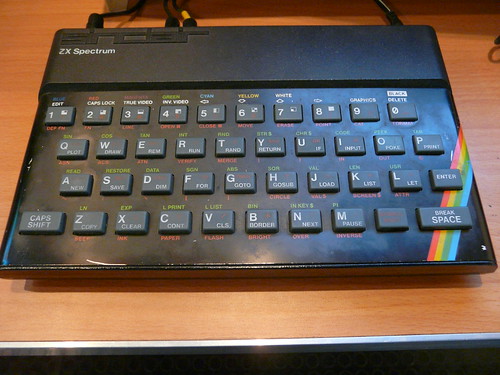In this, the last of a three-part series on girls and women in computing, PhD student and Further Education lecturer Amanda Wilson describes how an early interest in computing followed by picking up everything she could while working led to a dream job.
My first experience with computers was when I was about 6 or 7 and we had the Sinclair Spectrum at home. The wonderful ZX Spectrum, spongy keys and all! Photo by Loz Pycock https://www.flickr.com/photos/blahflowers/In honesty I just used to love pressing the buttons at first to see what would happen and not think much about what the results were – a common thing I see now in children. They have no fear of breaking the computer and are willing to just go for it and try.
The wonderful ZX Spectrum, spongy keys and all! Photo by Loz Pycock https://www.flickr.com/photos/blahflowers/In honesty I just used to love pressing the buttons at first to see what would happen and not think much about what the results were – a common thing I see now in children. They have no fear of breaking the computer and are willing to just go for it and try.
My brother switched between games consoles and PCs such as the Amstrad 464 which he used for gaming. However, the big book that came with it was what really got me interested as I loved spending ages typing in the code and trying to get something on screen (more often than not through errors first and then fixing them to finally get that little line on screen to move). But it was this that got me interested in studying computing, and when I was13 at Secondary School I finally got the chance. We used BBC micros and I loved writing little programs in BASIC – my highlight back then writing a program to turn little led lights on and off.
However as much as I loved computing I’m ashamed to say I didn’t do well in my exams for it and drifted away from it for a while. I was a geek, yes – but a severe maths geek until I left school when I decided to take a break from education and concentrate on family and work life. During my work life I found that as I was the youngest in the office I was soon relied upon for my computer skills. A sort of reverse ageism as it were: being young meant that I must know everything about computers.
The company I worked for did have an ICT guy and a company who came out as well to fix things when they went wrong. I have to say I owe a lot to these guys for sparking my interest again in computing, I would watch intently and ask lots of questions when they were around which they were always happy to answer and show me how things worked, which in turn meant that when the ICT guy left and budget was low I was the one everyone looked to for help when it went wrong. Something I didn’t plan for was my being cheap ICT/Computing labour – especially when I heard the last ICT guy was being paid twice as much as me and ICT wasn’t even in my remit. After leaving work to have my last child I had a lot of time to think about what I wanted to do career-wise and realised that I really was interested in learning more about computers and working with them.
I went into my first year undergraduate computing thinking that I wanted a job in programming that paid lots of money but have to say that by the time I got to 3rd year I had really changed my mind and had felt that I wanted to work more with others and educate them about computing.
I did get this chance in 4th year with my honours project to educate children about computing and also took part in a new module which gave us the chance to communicate computing to others(in our case we worked with secondary school children). I feel that this year made me realise that I wanted to be involved in computing education and research and more so I want to make sure the next generation enjoy computing and want to take it up as a subject and not just see computers as something they use for Facebook and music etc. That’s how I ended up undertaking my PhD looking at children constructing games in primary education and now, with the PhD almost complete, I am an educator working in FE teaching the subject I love. Which, I should say, I will happily teach to anyone as I run clubs in my local primary too hoping to spark interest in the children from an early age.
About Amanda Wilson
 Amanda is a part time computing lecturer in FE. As well as this she is a STEM ambassador and run after school computing clubs. When not doing this or spending time with her girls she is finishing off her PhD which looks at learning about programming through game-making in Primary Education.
Amanda is a part time computing lecturer in FE. As well as this she is a STEM ambassador and run after school computing clubs. When not doing this or spending time with her girls she is finishing off her PhD which looks at learning about programming through game-making in Primary Education.
Amanda tweets as @AmandaWilson169.
This article first appeared in the Appril 2015 issue of Digital Education.
The first part of this trilogy was Girls and Computing.
The second part was Girls and technology
For more articles like this, plus news, commentary and freebies, sign up for my ezine Digital Education, for great content, longer articles, book reviews, news, comment and guest articles.
